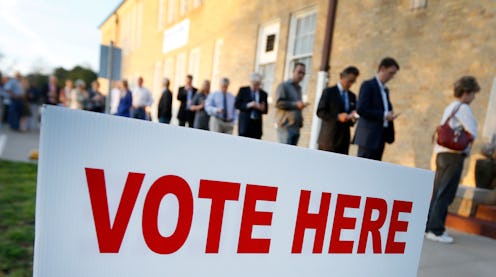Early voting in Texas started on Monday, marking the beginning of what certainly looks to be an exciting presidential race in the state. Unfortunately, there are already reports of inconsistencies and problems with Texas voter ID requirements at polling places, which is especially unnerving considering that Texas may now be a swing state in the 2016 presidential election.
Prior to a federal appeals court ruling this year, Texas had one of the most restrictive voter ID laws in the country, requiring voters to present one of seven specific forms of ID at their polling places in order to vote. However, in July of this year, the U.S. Fifth Circuit Court of Appeals deemed that this law restricted voters' rights and eased the ID requirements.
To legally vote in Texas, voters who possess one of the seven forms of ID delineated by the previous voter ID law are required to present this ID at their polling places. However, now, individuals who cannot "reasonably obtain" one of these forms of ID can still vote with a non-photo alternative form of identification, such as a utility bill.
The court's easing of Texas' voter ID law was considered important for ensuring that all eligible voters who desired to vote would be able to do so; however, unfortunately this week's reports regarding ID problems at early voting polling places indicate there's a clear, and potentially problematic, gap between law and practice.
According to The Texas Tribune, many polling places had signs up on Monday that described the old voter ID requirements, listing only the seven options for identification that were ruled too restrictive by the court. Those outdated signs could seemingly give voters the impression that they are only able to vote if they possess one of those forms of ID, even though that is not the case. According to the Tribune, these signs were spotted in at least 14 of 43 polling places in one Texas county. And on Tuesday, the signs remained in at least eight of these polling places, even after they'd been reported and had received media attention.
Beyond the signage issues, some polling workers reportedly had incorrect knowledge of the revised voter ID law and were providing voters with the wrong information about whether they were eligible to vote. According to NBC News, voters in Houston and Denton County reported being incorrectly told that they needed an ID. Additionally, The Texas Tribune reported that voters in at least three counties said poll workers were not actively telling voters about alternate forms of identification.
Texas officials have been somewhat responsive to the polling place ID issues. The County Clerk's Office for Bexar County indicated that old posters were replaced with new ones on Tuesday, though the Mexican Legal Defense and Education Fund still found at least eight old posters present in county polling places on Tuesday evening. The Texas Secretary of State's office also briefly touched on the issue, responding to a picture of a poster on Twitter on Monday, saying it would be "taken down." However, this response seems insufficient considering the potential ramifications of inaccurately enforced voter ID laws at Texas polling places.
The voter ID law was changed because, in its initial form, it potentially left more than 600,000 eligible voters, many of whom were poor or people of color, unable to vote. Despite the legal change, if voter ID laws are being improperly implemented at polling places, these same people could be left disenfranchised and unable to vote in this crucially important election.
Texas, a hugely populous state with 38 electoral votes, has the potential to radically impact this election, especially considering that, for the first time since 1976, the Democratic presidential candidate could potentially win the popular vote in the state; that means Texas is now likely legitimately in play as a swing state in the election. Therefore, it is more important than ever that every Texan's voice is heard in this election and that all eligible voters be allowed to vote in accordance with the law.
